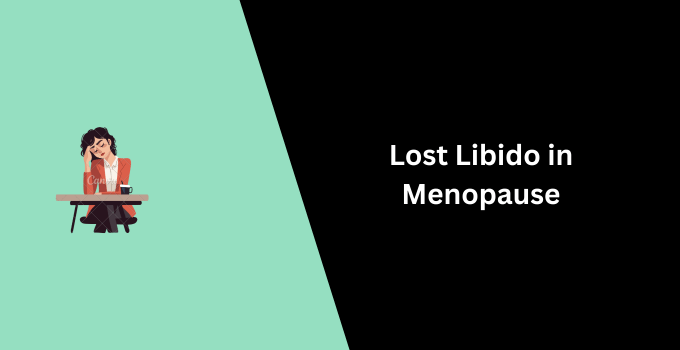
Menopause can lead to decreased libido in women due to hormonal changes, with estrogen and testosterone levels declining. These changes may affect sexual desire and arousal. According to a study in the journal Menopause, about 20-40% of menopausal women experience diminished libido.
Maintaining a healthy lifestyle, open communication with partners, and seeking medical advice for potential treatments like hormone therapy can help manage symptoms. It’s important for women to discuss concerns with healthcare providers for personalized care.
In this article we’ll explain the main reason begin losing libido due to menopause.
Hormonal Changes Explained
During menopause, you’ll experience significant hormonal shifts that directly impact your sexual desire. The plunge in estrogen and testosterone can lead to a decline in sexual desire, altering your overall sexual functioning. While it’s not solely tied to testosterone levels, the decrease in this hormone can dull your sexual arousal.
Additionally, lower oestrogen levels contribute to physical effects such as vaginal dryness, which can make sex uncomfortable or less enjoyable.
You might hear about hormone replacement therapy (HRT) as a way to counter these changes. While it can replenish estrogen levels, it’s not a one-size-fits-all solution. Some women, even with hormonal upheavals, maintain their libido.
Psychological Impact Assessed
With the onset of menopause, you might find that the psychological effects of a waning libido go beyond the bedroom, impacting your self-esteem and emotional well-being. The menopause affect isn’t just physical; the loss of desire can skew your attitudes toward sex, leaving you feeling disconnected.
Management of Libido Problems must address not only the biological but also the psychological.
Your sexual functioning, now altered, may lead to a psychological impact assessed as significant. Negative shifts in body image and mood changes can arise as you grapple with sexual difficulties. And if sex is painful, that, too, can cast a long shadow over your psyche.
It’s essential to understand these profound effects to navigate this challenging phase with grace and self-compassion.
Lifestyle Factors Addressed
As you navigate through menopause, understanding how daily habits, stress levels, and overall health shape your sexual desire is crucial. The ebb and flow of your libido and sexual motivation aren’t just about physical changes; they’re deeply intertwined with lifestyle factors addressed daily.
If you’re experiencing a dip in your interest in sex, consider how your routine, stress, and relational dynamics contribute to sexual problems.
Menopause can bring about sexual dysfunction, not solely through hormonal shifts affecting vaginal lubrication but also through the psychological impact of those changes.
Engaging in regular relaxation practices, exploring hormone replacement therapy, and open communication with your partner can help reignite your sexual activity. Remember, a fulfilling sexual life during menopause is possible when these elements are thoughtfully managed.
Treatment Options Explored
Exploring treatment options can significantly enhance your sexual wellness during menopause, offering both hormonal and non-hormonal paths to reclaiming your libido. Here are your options:
1. Hormone Replacement Therapy (HRT):
- It can alleviate menopause symptoms and improve sexual desire by balancing your hormones.
2. Pelvic Floor Exercises:
- Strengthen your pelvic muscles to enhance arousal and increase blood flow to vaginal tissues.
3. Testosterone Supplementation:
- Testosterone can be prescribed for some postmenopausal women to boost libido during the menopause transition.
4. Vaginal Estrogens and Therapy:
- Use prescribed vaginal estrogens to soothe vaginal symptoms.
- Consider seeing a sex therapist to tackle underlying issues affecting libido and menopause.
Treatment options explored should fit your specific needs, so consult your healthcare provider to find the best path for you.
Rekindling Intimacy Techniques
Once you’ve considered the range of treatment options, it’s essential to focus on techniques that reignite the spark of intimacy during menopause. Prioritize foreplay to address vaginal changes and improve blood supply, easing muscle tension and enhancing arousal.
Communicate openly with your partner about fluctuating levels of desire. This honesty can lead to deeper connection and sexual satisfaction.
Consider visiting a menopause clinic or consulting the American Menopause Society for guidance on rekindling intimacy techniques. Being sexually active requires adapting to your evolving body.
Incorporate mindfulness to stay present, reducing distractions and boosting desire and arousal. Experiment with erotic materials or alterations in your sexual routine.
Frequently Asked Questions
Conclusion
As you stand at menopause’s threshold, imagine regaining your sensual spark. Picture the warmth returning, the closeness with your partner rekindling. Embrace the journey; with guidance, lifestyle shifts, and perhaps medical support, you can navigate this transformation.
Visualize the intimacy blooming anew, a testament to your resilience and adaptability. Menopause isn’t an end but a different phase of passion, waiting to be rediscovered and cherished.
Affiliate Disclosure: Some of the links in this post are affiliate links, which means I may earn a small commission if you make a purchase through those links. This comes at no extra cost to you. Thank you for your support!
